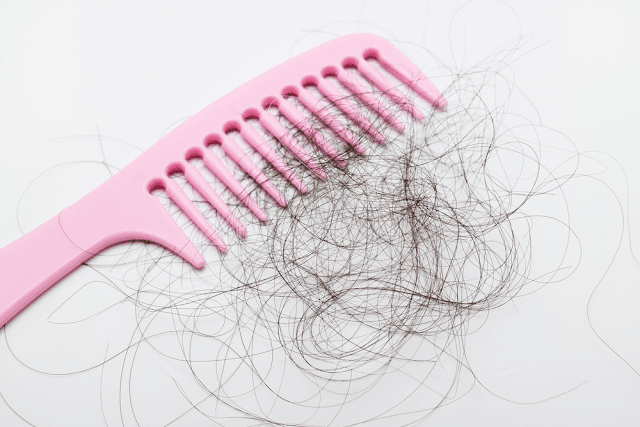DO YOU SUFFER FROM HAIR LOSS? – KNOW HOW AYURVEDA CAN HELP
Having healthy and good-looking dense hair is the dream of every individual. In this present fast – paced lifestyle, due to hectic schedule, stress, increasing pollution, contamination of water and air, dust, unhealthy diet, use of too many chemical products on hair there is increase in the incidence of hairfall. Hairfall can be embarrassing and hamper one’s self esteem and confidence. Every day when you see hairs on your comb and start noticing the receding hairline and sparse hair on your scalp, you begin to have the worst fear of losing all your hairs. So you start trying different chemical shampoos, hair packs, etc. which makes the condition even worse.
What causes hair fall?
Hair loss is one of the major problems of the present generation. It can affect anyone. Hairfall can occur due to many reasons - hormonal imbalance, nutritional deficiencies, underlying medical condition like hypothyroid and anemia, some prescription medicines like blood thinners, cancer treatment like radiation and chemotherapy and the use of anabolic steroids and birth control pills. The underlying causative factor should be addressed while treating hairfall.
Are you eating the right diet?
For healthy hair, internal and external nourishment is necessary. Lack of sufficient intake of proteins, vitamins and minerals in diet may lead to hairfall. Diet low in iron can lead to anemia, which is the major cause of hair loss. Lack of zinc in diet leads to dry and flaky scalp. Vitamin A is needed to make sebum, which provides a natural conditioning for scalp. Vitamin A deficient diet can cause itchy scalp and dry hair. Low protein diet leads to dry, brittle and weak hairs.
How does Ayurveda help to control hair fall?
Ayurvedic treatment modality which includes administration of suitable herbs along with intake of healthy and balanced diet rich in proteins, following healthy lifestyle, controlling stress, and oil massage is effective in controlling and preventing hair fall. The following simple tips will help you to get back your thick hairs and control hairfall -
- Do not pour hot water on scalp. It causes hair fall and affects hair growth.
- Avoid excess exposure to sun.
- Use natural substances like Amalaki (Indian gooseberry) or Shikakai or Reetha (Soap nut) for washing hair instead of chemical shampoos. If you use Ayurvedic shampoos, dilute it with little water and use it.
- Avoid the following practices – vigorous combing / brushing, excess shampooing, combing wet hair, rubbing wet hair dry with a towel excessively, frequent colouring / dyeing or hairs, using hair sprays or gels on a regular basis or frequent use of hair driers or straighteners.
- Apply warm oil on scalp and do self-massage gently with fingertips for 5 – 10 min. twice or thrice a week. This will help to replenish the hair roots and provide nourishment.
- Cover your hair with scarf before you wear helmet and wash the scarf everyday. Avoid applying oil on scalp after hair-wash as keeping oil on scalp the whole day will block the hair follicles from getting nourishment due to pollution and leads to hair fall and dandruff too.
- Manage stress with Yoga, meditation and breathing exercise.
- Reduce excess intake of ice cold drinks, oily, deep-fried food, hot, spicy food and sour food items.
- Avoid alcohol.
- Protein is essential for making hair healthy and strong. So increase protein intake in diet. Lentils, beans, tofu, seeds, nuts, chicken, turkey, fish, dairy products and eggs are excellent sources of protein.
- Include sprouts, whole grains, ghee, cereals, grapes, pumpkin, bottle gourd, broccoli, spinach, salad greens, pomegranate, coconut and oysters in diet.
- Apply paste of henna leaves or egg white or fenugreek paste or aloe Vera gel on the hair and leave it for 20 minutes. Then rinse thoroughly. This promotes hair growth and can be done once or twice a week.
- Ayurveda herbs like Bhringaraj, Bhumiamalaki, Amalaki, Neem, Jatamansi, Brahmi, Guduchi, Licorice, Fenugreek are beneficial.
- Ayurveda Detoxification therapies like Nasya, Dhooma, Shirolepa, Shirodhara, Virechana gives good results.
With all these simple remedies you will get back your thick, silky and shiny hair.

Comments
Post a Comment